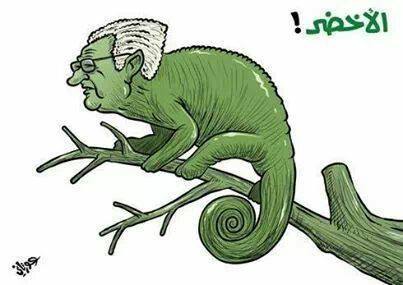"But we're still hoping that we'll be able to have the conference before the end of the year," he said, adding he would meet again with Russian and US officials on November 25.
His comments followed a day of intense discussions with senior diplomats in Geneva aimed at preparing a new international conference to try to end the Syrian conflict.
A landmark Russian-US accord reached in September to destroy Syria's chemical arsenal by mid-2014 had raised hopes that diplomatic efforts might also manage to coax the warring sides to the table later this month.
But Tuesday's meeting ended without a date.
Pressed to reveal the main stumbling blocks, Brahimi cited divisions within the Syrian opposition, saying he hoped they would "move towards the formation of a credible delegation" for peace talks.
"That will be a big step forward to make the conference possible," the Algerian veteran international mediator said.
The main umbrella opposition National Coalition has said it plans to meet in Istanbul on Saturday to decide whether to attend the peace talks.
But a key member of the bloc has threatened to quit if it decides to attend, and some rebels have warned all participants will be deemed traitors.
A senior US official voiced optimism that the conference, dubbed Geneva II, could be held by the end of the year, but stressed the importance of giving the splintered opposition time to create a representative delegation.
"This is about building the future of Syria. That is a long, difficult, complicated process. If it takes the opposition coalition a few more weeks to prepare themselves in the way they feel they need to .. we want to support them to do that," the official said, requesting anonymity.
Russia, a staunch ally of the Syrian regime, was meanwhile planning to meet with members of the Syrian opposition in Geneva on Wednesday, Deputy Foreign Minister Gennady Gatilov, who took part in Tuesday's talks, told Russian media.
Brahimi also pointed to splits over a potential role for Iran, a staunch ally of Syrian President Bashar al-Assad, in the peace conference.
Russian Foreign Minister Sergei Lavrov reiterated Tuesday that Moscow wants Iran to be at the table, despite threats from Syrian rebels that they will boycott the conference if that happens.
Iranian Foreign Minister Mohammad Javad Zarif told French broadcaster France 24 that his country could contribute to finding a "peaceful resolution of this tragic situation in Syria".
"If invited, we will participate," he said.
Washington meanwhile remains deeply skeptical of Iran's participation, with the senior US official pointing out that Tehran so far had not accepted a never-implemented transition plan agreed during an initial conference last year.
Asked whether Washington would accept Iran's participation if Tehran accepts that transition plan, the official said: "We'll see."
Assad 'will remain head of state'
The fate of Assad also remains a major sticking point, with the divided opposition refusing to attend unless his resignation is up for discussion -- a demand rejected by Damascus.
The Syrian regime, whose participation in the talks has long been seen as a given, stressed Monday it would not accept negotiations that aimed to oust Assad.
"We will not go to Geneva to hand over power as desired by (Saudi Foreign Minister Prince Saud) al-Faisal and certain opponents abroad," Omran al-Zohbi was quoted by the official SANA news agency as saying.
"President Bashar al-Assad will remain head of state," he added.
Visiting Poland Tuesday, US Secretary of State John Kerry underscored that the point of a peace conference was to put in place a transition government acceptable to both sides.
"I don't know how anybody believes the opposition is going to give mutual consent to Assad to continue," Kerry told reporters, a day after visiting Riyadh to try to calm Saudi fears that Washington's resolve to push Assad from power is fading.
Saudi Arabia and Qatar, two major backers of the Syrian rebels, have meanwhile stressed the need for a clear timetable for the conference, with al-Faisal international action.
Tuesday's meeting took place amid growing alarm about the humanitarian situation in Syria, where more than 120,000 people have been killed in the 31-month conflict.
Some 9.3 million people, or nearly half of the Syrian population, are now in need of humanitarian assistance while 6.5 million people have been displaced in Syria and some 2.2 million have fled the country, according to UN data.
-----------------------------------------------------------------------------------------------------
His comments followed a day of intense discussions with senior diplomats in Geneva aimed at preparing a new international conference to try to end the Syrian conflict.
A landmark Russian-US accord reached in September to destroy Syria's chemical arsenal by mid-2014 had raised hopes that diplomatic efforts might also manage to coax the warring sides to the table later this month.
But Tuesday's meeting ended without a date.
Pressed to reveal the main stumbling blocks, Brahimi cited divisions within the Syrian opposition, saying he hoped they would "move towards the formation of a credible delegation" for peace talks.
"That will be a big step forward to make the conference possible," the Algerian veteran international mediator said.
The main umbrella opposition National Coalition has said it plans to meet in Istanbul on Saturday to decide whether to attend the peace talks.
But a key member of the bloc has threatened to quit if it decides to attend, and some rebels have warned all participants will be deemed traitors.
A senior US official voiced optimism that the conference, dubbed Geneva II, could be held by the end of the year, but stressed the importance of giving the splintered opposition time to create a representative delegation.
"This is about building the future of Syria. That is a long, difficult, complicated process. If it takes the opposition coalition a few more weeks to prepare themselves in the way they feel they need to .. we want to support them to do that," the official said, requesting anonymity.
Russia, a staunch ally of the Syrian regime, was meanwhile planning to meet with members of the Syrian opposition in Geneva on Wednesday, Deputy Foreign Minister Gennady Gatilov, who took part in Tuesday's talks, told Russian media.
Brahimi also pointed to splits over a potential role for Iran, a staunch ally of Syrian President Bashar al-Assad, in the peace conference.
Russian Foreign Minister Sergei Lavrov reiterated Tuesday that Moscow wants Iran to be at the table, despite threats from Syrian rebels that they will boycott the conference if that happens.
Iranian Foreign Minister Mohammad Javad Zarif told French broadcaster France 24 that his country could contribute to finding a "peaceful resolution of this tragic situation in Syria".
"If invited, we will participate," he said.
Washington meanwhile remains deeply skeptical of Iran's participation, with the senior US official pointing out that Tehran so far had not accepted a never-implemented transition plan agreed during an initial conference last year.
Asked whether Washington would accept Iran's participation if Tehran accepts that transition plan, the official said: "We'll see."
Assad 'will remain head of state'
The fate of Assad also remains a major sticking point, with the divided opposition refusing to attend unless his resignation is up for discussion -- a demand rejected by Damascus.
The Syrian regime, whose participation in the talks has long been seen as a given, stressed Monday it would not accept negotiations that aimed to oust Assad.
"We will not go to Geneva to hand over power as desired by (Saudi Foreign Minister Prince Saud) al-Faisal and certain opponents abroad," Omran al-Zohbi was quoted by the official SANA news agency as saying.
"President Bashar al-Assad will remain head of state," he added.
Visiting Poland Tuesday, US Secretary of State John Kerry underscored that the point of a peace conference was to put in place a transition government acceptable to both sides.
"I don't know how anybody believes the opposition is going to give mutual consent to Assad to continue," Kerry told reporters, a day after visiting Riyadh to try to calm Saudi fears that Washington's resolve to push Assad from power is fading.
Saudi Arabia and Qatar, two major backers of the Syrian rebels, have meanwhile stressed the need for a clear timetable for the conference, with al-Faisal international action.
Tuesday's meeting took place amid growing alarm about the humanitarian situation in Syria, where more than 120,000 people have been killed in the 31-month conflict.
Some 9.3 million people, or nearly half of the Syrian population, are now in need of humanitarian assistance while 6.5 million people have been displaced in Syria and some 2.2 million have fled the country, according to UN data.
-----------------------------------------------------------------------------------------------------









 Home
Home Politics
Politics











